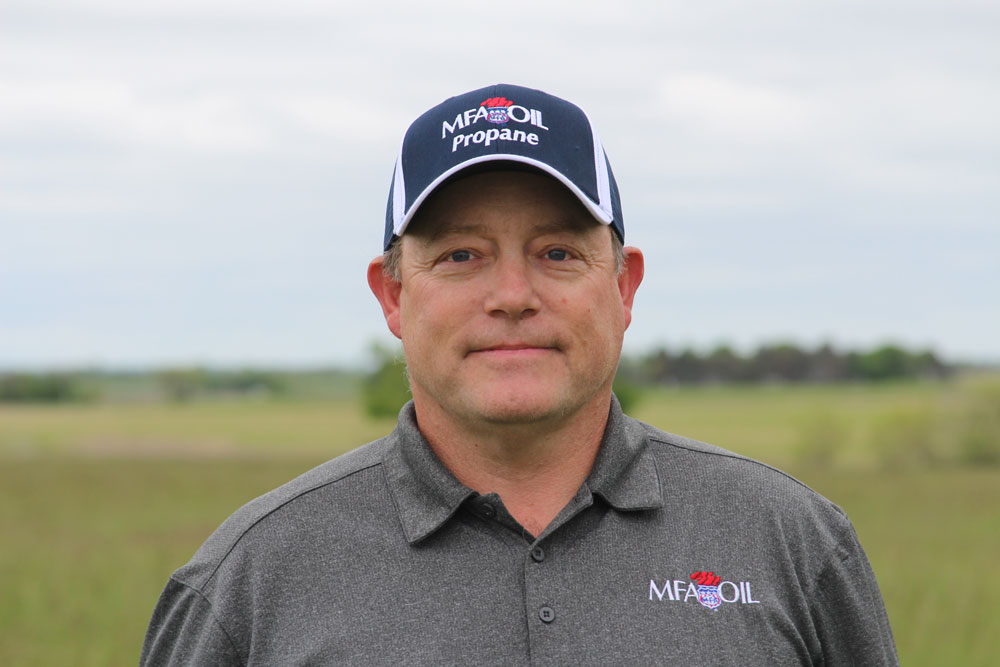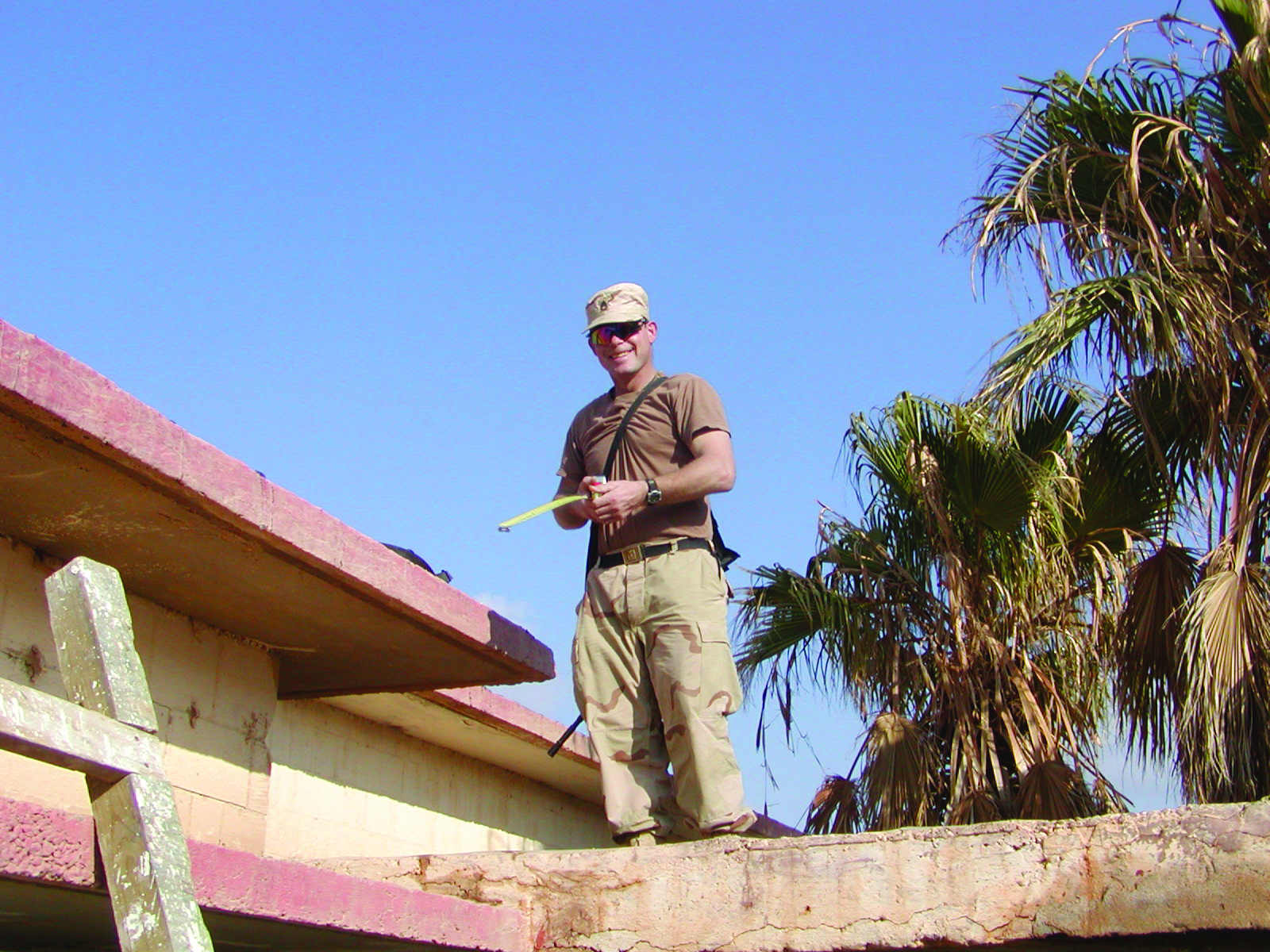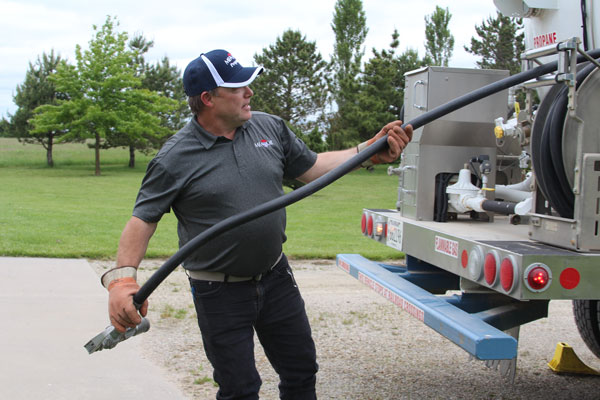
Man on a Mission
June 22, 2020
Written By Adam Buckallew
Tom Cushing climbs out of a propane bobtail truck, unfurls its heavy hose and stretches it toward a customer’s nearby tank. The way he moves it’s hard to tell the man once sustained a back-breaking injury that would lead to the eventual replacement of both of his hips.
Cushing’s job of managing MFA Oil’s Emporia, Kan., office is not quite as exciting as his previous career with the U.S. Army, but then again, he doesn’t have to worry about driving over explosives hidden in the road anymore, which is a welcome tradeoff.
For 25 years, Cushing served in the U.S. military. He was deployed six times, including assignments in war zones in Iraq and Afghanistan and hot spots like the Korean Demilitarized Zone. He held a variety of leadership roles during his tenure with the military – most of which dealt with the maintenance and repair of tactical and armored vehicles. He worked as a mechanic and motor sergeant, and during his final deployment to Iraq, he served as the senior maintenance supervisor responsible for maintaining a fleet of over 400 vehicles for the commander of the Multi-National Forces in the Iraq War.
In September 2003, Cushing and members of his signal company brigade were sent to Ar-Ramadi, the provincial capital of Iraq’s Al Anbar Governorate, which sits about 68 miles west of Baghdad, to support the Army’s 82nd Airborne Division and later the Marines. As motor sergeant, Cushing, along with about 20 mechanics he oversaw, was responsible for maintaining equipment at 17 different Army installations in the region.
As part of the signal company, Cushing and his team’s primary responsibility was to ensure the generators that powered the U.S. military’s communications equipment and vehicles remained operational. In the blistering heat of the Arabian Desert, where temperatures could reach up to 130°F, it’s not uncommon for equipment to overheat. Then there were the sandstorms.

“The sand would get everywhere, including into our equipment,” Cushing recalls. “The storms would be so bad that you could hold your hand in front of your face and not be able to see it.”
Cushing was frequently exposed to the elements as he hitched rides with supply convoys, which could range from four vehicles to up 75. Most trips were made to retrieve ammunition, parts, food and water or to make repairs at an off-site location.
It was never difficult for Cushing to catch a ride.
“I got a yes every time I asked,” Cushing says. “Convoys always wanted mechanics to tag along in case a problem would arise. They looked at us much in the same way they looked at medics. We were always welcome.”
As it turned out, problems were routine for the convoys. Hostile forces frequently tried to ambush U.S. troops when they made their supply runs, and their preferred method of attack was the improvised explosive device or IED. Each convoy that travelled through the Ar-Ramadi region in 2003 to 2004 encountered an average of six IED attacks per trip.
Knowing the dangers of the road, Cushing tried to limit the movement of his mechanics as much as possible. He wanted to ensure they were all able to go home. So, he had them stay with the communications equipment, which was mostly stationary, and he would travel to them and bring whatever tools or parts them may need to do their jobs.
The trips always carried a weight of peril that could be amplified based on the circumstances. In one of the longer trips he made, Cushing traveled more than 370 miles in a Humvee with canvas doors.
“It had no armor,” Cushing says as he remembers placing sandbags on the floorboard of the vehicle to absorb the potential impact of a roadside bomb. “We had to make do with what we had.”
That trip ended without incident, but other excursions were not so fortunate. In time, Cushing’s vehicles would be hit by IED attacks on four separate occasions. The concussive blast of one explosive lifted the Humvee he was riding in eight feet off the asphalt road. All of the vehicle’s windows were shattered. Cushing and the soldiers he was riding with were bleeding from their noses and ears, but in a situation like that, there’s little time to conduct full medical exams. They “self-recovered” and moved on with their mission.
The force of the explosions took their toll on Cushing’s health and forced his retirement from the Army in 2015.
“The damage to my back and spine just kept slowly creeping up on me,” Cushing says.
Cushing’s wife of 30 years, Angel, says the breaks in his back changed the curvature of his spine, which led to wear on his hips. As Angel sat by her husband’s side as he recovered from bilateral hip replacement surgery in February, she reflected on Cushing’s devotion to the men under his command.
“Tom never considered whether his actions would keep him from reenlisting,” she wrote in a letter to the editor in support of a convention of states. “Tom got to meet a few…medics, always briefly. As soon as they walked away, he was gone. He always had a mission to finish. If one of those medics had tied him down or given him a sedative when he was in their care, he would have woken up mad and taken the triage bed with him. His mechanics were not expendable. He brought every single one of his soldiers home.”

Upon his return to civilian life, Cushing began working as a facility supervisor at Pomona State Park outside of Vassar, Kan. But it wasn’t long before he began to see similarities between the bureaucracy of his previous career and his new job with the State of Kansas. He sought out a change of scenery and took a job as a service technician with S & S Oil Company, which would be acquired by MFA Oil Company about a month after Cushing arrived.
Cushing enjoyed the relative freedom and flexibility service technicians and drivers were given to do their jobs. He worked as a driver, hauling propane, fuel and bulk oil, before accepting a promotion to become plant manager in December 2019. He’s found the lessons he learned in the military of flexibility, adaptability and commitment to the mission have served him well in his new role.
“My goal was to always try and leave a place better than how I found it,” Cushing says. “That’s how I approach everything I’ve done to this point in my career and I continue to do so.”
Cushing’s new professional priority is servicing the energy needs of his customers in east-central Kansas. To accomplish that goal, he’s working with the drivers, service technicians and customer service representatives in his area to ensure they have the support they need to get the job done. It’s his latest mission, and one he’s proud to accept.

